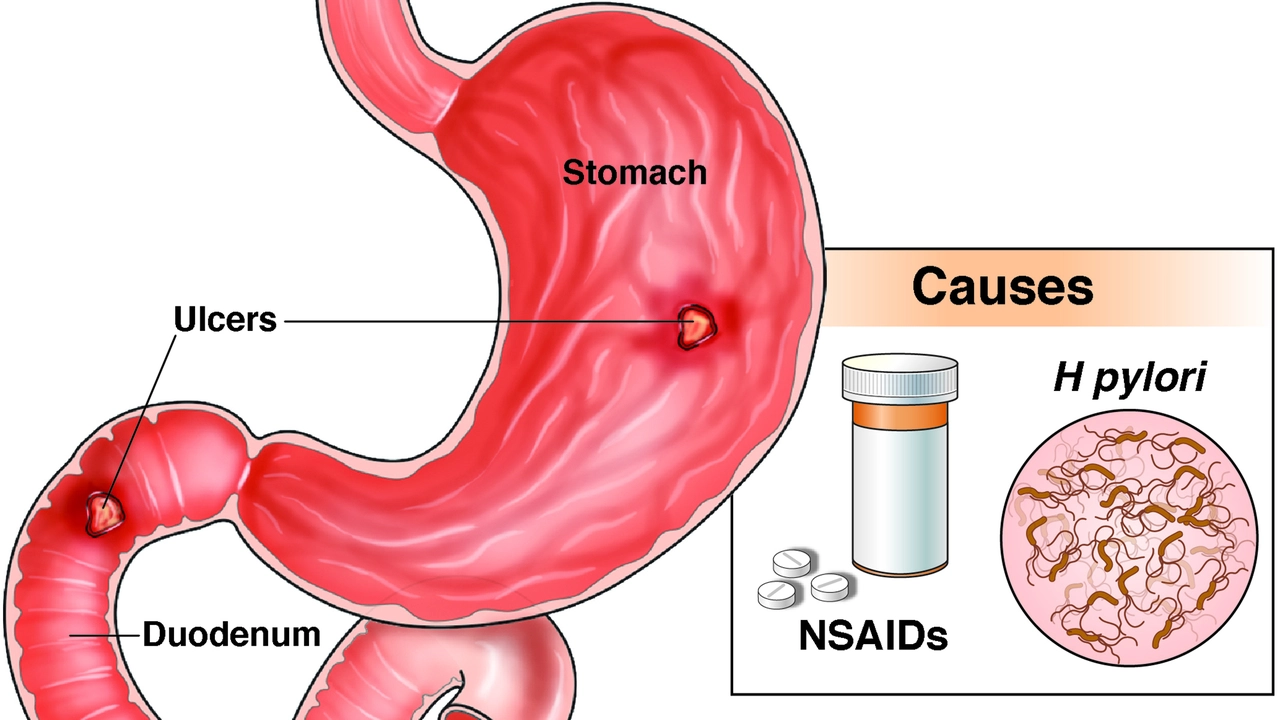Stomach ulcers: what they are and what to do now
Here’s a blunt fact: most stomach ulcers are caused by a bug called H. pylori or by common painkillers — not by stress or spicy food. That makes a difference, because the right treatment fixes the root cause. This page gives clear, useful steps you can take and signs that mean you need urgent care.
Common causes and warning signs
Ulcers (peptic ulcers) are open sores in the stomach lining or the first part of the small intestine. The main causes are:
- H. pylori infection — a bacteria you can test for and treat with antibiotics. - Long-term use of NSAIDs like ibuprofen or naproxen, which can damage the lining. - Smoking and heavy alcohol use, which slow healing and make ulcers worse.
Symptoms often include a burning or gnawing pain between the breastbone and belly button, bloating, belching, nausea, or a feeling of fullness after small meals. Be aware: some people have no pain and only notice anemia or weight loss.
How doctors diagnose and when to act
Your doctor will ask about medicines, test for H. pylori (breath test, stool antigen, or blood test), and may order an endoscopy if you have severe symptoms. Go to the ER or see a doctor right away if you have: vomiting blood, black or tarry stools, fainting, sudden severe stomach pain, or rapid heart rate. Those are red flags for bleeding or a perforated ulcer.
Treatment depends on the cause. If H. pylori is found, a short course of antibiotics plus acid suppression (usually a proton pump inhibitor, or PPI) is standard and often cures the ulcer. If NSAIDs caused it, stopping them and using a PPI or H2-blocker helps healing. Antacids can give quick relief but don’t replace medical treatment.
Small practical tips: stop or reduce NSAIDs when possible — switch to acetaminophen if appropriate and advised by your doctor. Quit smoking and cut back on alcohol while healing. Take PPIs exactly as prescribed, and finish the full antibiotic course if you’re treated for H. pylori. If you drink alcohol and use stomach medicines, check interactions — our site has a gastroenterologist guide about alcohol and antacids that’s worth reading.
Prevention is straightforward: test and treat H. pylori if you have recurrent symptoms, avoid long-term NSAID use or use the lowest effective dose with protective medication, and maintain healthy habits like not smoking. For recurrent or complicated ulcers, specialists may consider other options — your doctor will explain them.
If you’re unsure whether your stomach pain is an ulcer, book a checkup. A simple test can find H. pylori, and early treatment often stops problems before they get serious. Small steps now — testing, stopping risky meds, and following treatment — usually put you on the road to recovery fast.
The Importance of Early Diagnosis and Treatment for Stomach Ulcers
Hey, folks! So, I've been reading up on stomach ulcers and boy, it's a whole new world in there! Early diagnosis and treatment of these pesky ulcers are like the superheroes of the gut world, swooping in just in time to save the day. With a quick diagnosis, we can jump right into treatment and wave goodbye to those bellyaches, nausea, and heartburn. Plus, we can avoid complications that sound like plot twists in a horror movie - think bleeding ulcers and perforations. So, let's not be shy, folks, let's get those tummies checked and keep the ulcer monsters at bay!
View More
